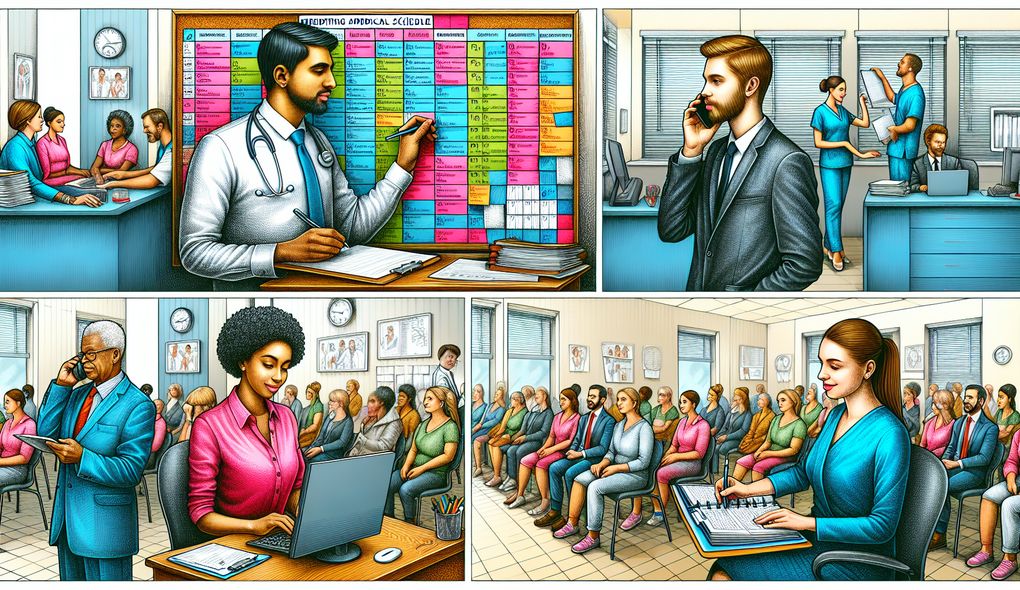How do you collaborate with medical staff to establish patient priorities?
INTERMEDIATE LEVEL

Sample answer to the question:
In my previous role as a Medical Scheduler, I collaborated with medical staff to establish patient priorities by actively communicating with physicians and nurses. I would regularly attend meetings with medical staff to discuss patient needs and determine the urgency of appointments. We would review patient medical records and assess their conditions to prioritize their appointments accordingly. Additionally, I would utilize our scheduling software to efficiently manage the appointment slots and ensure that high-priority patients were scheduled with appropriate urgency. This collaboration helped ensure that patients received timely care based on medical staff recommendations.
Here is a more solid answer:
In my previous role as a Medical Scheduler, I collaborated closely with medical staff to establish patient priorities. I would proactively reach out to physicians and nurses to gather information about patients' conditions and their recommended appointment urgency. This involved regular communication through email, phone calls, and in-person meetings. I would carefully review patient medical records, paying attention to notes from doctors and nurses about the severity of their conditions. This helped me determine the priority level for each patient and schedule their appointments accordingly. I would also use our scheduling software to optimize the scheduling process and ensure that high-priority patients were given appropriate urgency. If there were scheduling conflicts or changes, I would promptly communicate with both the patients and healthcare providers to resolve the issues. By collaborating closely with medical staff, I was able to effectively establish patient priorities and ensure that patients received the care they needed in a timely manner.
Why is this a more solid answer?
The solid answer provides more specific details on how the candidate collaborates with medical staff. It demonstrates their skills in effective communication by mentioning various communication methods used and the importance of promptly resolving scheduling conflicts. It also shows their abilities in time management and organizational skills by describing how they review patient medical records and optimize the scheduling process. However, it could still provide more examples of problem-solving and critical thinking skills.
An example of a exceptional answer:
Collaboration with medical staff is crucial for establishing patient priorities, and in my previous role as a Medical Scheduler, I excelled in this area. I established strong relationships with physicians and nurses, regularly attending meetings to discuss patient needs and priorities. I would actively contribute to these discussions by providing insights from my interactions with patients and my understanding of their medical conditions. This collaborative approach ensured that all perspectives were considered when determining patient priorities. Additionally, I developed a systematic approach to managing appointment schedules, which included analyzing medical records and consulting with medical staff to weigh the urgency of each patient's condition. I also implemented a proactive system for monitoring and addressing scheduling conflicts, which helped minimize any disruptions to patient care. By leveraging my problem-solving and critical thinking skills, I was able to identify patterns in patient scheduling and propose improvements to optimize the booking process. My collaboration with medical staff went beyond establishing patient priorities and extended to ongoing communication to address any changes in patient conditions or scheduling needs. Overall, my exceptional collaboration skills and proactive approach allowed for efficient and patient-centered scheduling practices.
Why is this an exceptional answer?
The exceptional answer goes above and beyond by highlighting the candidate's extensive collaboration with medical staff. It showcases their ability to contribute valuable insights during meetings and their proactive approach in managing schedules. The answer also demonstrates their problem-solving and critical thinking skills by identifying patterns in scheduling and proposing improvements. The candidate's exceptional collaboration skills and ongoing communication with medical staff further emphasize their commitment to efficient and patient-centered scheduling practices.
How to prepare for this question:
- Familiarize yourself with medical terminology and healthcare operations to effectively communicate with medical staff.
- Practice active listening skills to understand the needs and priorities of medical staff.
- Develop a systematic approach to managing appointment schedules, considering factors such as patient conditions and urgency.
- Improve problem-solving and critical thinking skills by practicing scenario-based exercises.
- Stay updated on the latest scheduling software and techniques to optimize the scheduling process.
What are interviewers evaluating with this question?
- Effective communication
- Time management and organizational skills
- Problem-solving and critical thinking skills

